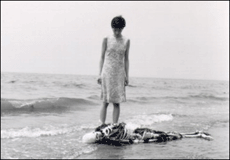Pulse (Kiyoshi Kurosawa) 2002 / Barren Illusion (Kiyoshi
Kurosawa) 1999
 There are movies that require a lot from you and make their audience work hard
to earn their rewards, and then there are those that simply don’t feel worth
the effort you put forth. Although they’re hardly the most obtuse or
impenetrable films imaginable, Pulse and
Barren Illusion, two of acclaimed
Japanese director Kiyoshi Kurosawa’s newer films, strike me as ones that fail
to repay the audience’s faith. Both films are filled with empty gray
landscapes that must supposedly reflect the inner emptiness of the disassociated
youth that dwell within them, and if that strikes you as an exciting visual
motif, perhaps they’re up your alley. To me, the mellowness that abounds in
the movies feels like a betrayal of the conflicted and deep emotions that
Kurosawa’s characters surely must feel, but rarely are allowed to emerge.
There are movies that require a lot from you and make their audience work hard
to earn their rewards, and then there are those that simply don’t feel worth
the effort you put forth. Although they’re hardly the most obtuse or
impenetrable films imaginable, Pulse and
Barren Illusion, two of acclaimed
Japanese director Kiyoshi Kurosawa’s newer films, strike me as ones that fail
to repay the audience’s faith. Both films are filled with empty gray
landscapes that must supposedly reflect the inner emptiness of the disassociated
youth that dwell within them, and if that strikes you as an exciting visual
motif, perhaps they’re up your alley. To me, the mellowness that abounds in
the movies feels like a betrayal of the conflicted and deep emotions that
Kurosawa’s characters surely must feel, but rarely are allowed to emerge.
Pulse is less guilty of Kurosawa’s minimalist sins, but they still sank
the film for me. The film opens with screeching modem noise, and the frame
skitters out of space early on, suggesting that the movie is bursting at the
seams with electric energy. Unfortunately, within twenty minutes, the movie
seems to have settled into a sense of calm that makes its scare scenes feel much
closer to vaguely unsettling than genuinely frightening. It’s sad that the
best jolt comes within the first twenty minutes because the premise has a lot of
potential. After we view a prologue that drains away much of the film’s
suspense (“Well, we know she lives,
now!” the audience will say.), the movie settles on a group of young botanists
haven’t heard from their computer geek friend in a week, and upon going to his
apartment, we see that he has become utterly despondent. A disk that he leaves
behind before offing himself contains a haunting image of him sitting at his
computer that reveals a spooky face in his monitor’s reflection. Meanwhile, a
technological neophyte decides to get online, only to find hazy web cam images
of zombie-like people and a cryptic message that asks him “Would you like to
meet a ghost?”
 As the movie progresses, we come to understand the reasoning
behind the film’s aversion toward technology, but I found the explanations
less than satisfying, and the movie’s Luddite stance grew increasingly
tiresome as it droned on. The male hero in the film, who is the aforementioned
neophyte, only survives as long as he does because he’s so dumb and
bullheaded. The numerous eerie images that pile up (including “Forbidden
Rooms” sealed with red tape and dusty black stains that mark people’s
disappearances) begin to lose, instead of gain, their power to frighten us as
they grow increasingly scattershot and ever more artsy. Before long, it becomes
apparent that the film’s calculated elusiveness has the effect of distancing
us from the story, much like the characters are distanced from each other, and
while this might be Kurosawa’s goal, it’s not at all an entertaining one.
Frankly, Maximum Overdrive, the cheesy
Stephen King epic from the eighties, paints a more terrifying portrait of
technology gone wrong than in the bizarrely bloodless Pulse,
which feels roughly like a somnambulistic version of a camp movie yet to be made
(think “I Was a Teenage Internet Zombie!”). At least the American shock
cinema that this film recalls, like 1984’s valley girl apocalyptic vision Night
of the Comet, had a sense of fun. Here it’s all showy buildup with no real
payoff. Fear works best when we’re not pondering the condition of modern man,
and as a result Pulse feels listless.
As the movie progresses, we come to understand the reasoning
behind the film’s aversion toward technology, but I found the explanations
less than satisfying, and the movie’s Luddite stance grew increasingly
tiresome as it droned on. The male hero in the film, who is the aforementioned
neophyte, only survives as long as he does because he’s so dumb and
bullheaded. The numerous eerie images that pile up (including “Forbidden
Rooms” sealed with red tape and dusty black stains that mark people’s
disappearances) begin to lose, instead of gain, their power to frighten us as
they grow increasingly scattershot and ever more artsy. Before long, it becomes
apparent that the film’s calculated elusiveness has the effect of distancing
us from the story, much like the characters are distanced from each other, and
while this might be Kurosawa’s goal, it’s not at all an entertaining one.
Frankly, Maximum Overdrive, the cheesy
Stephen King epic from the eighties, paints a more terrifying portrait of
technology gone wrong than in the bizarrely bloodless Pulse,
which feels roughly like a somnambulistic version of a camp movie yet to be made
(think “I Was a Teenage Internet Zombie!”). At least the American shock
cinema that this film recalls, like 1984’s valley girl apocalyptic vision Night
of the Comet, had a sense of fun. Here it’s all showy buildup with no real
payoff. Fear works best when we’re not pondering the condition of modern man,
and as a result Pulse feels listless.
 The supposedly rampant problems that Kurosawa wants to show
us in Pulse don’t feel at all
epidemic because of budgetary constraints, and this is also a problem that
haunts his even less successful Barren
Illusion. Besides containing the same non-solution that its characters
invent to solve their problems with the world (run away!) that is found in Pulse,
the movie shares its successor’s dystopic outlook. As much a sci-fi film as Pulse
is a horror one, Barren Illusion relies on even fewer special effects to
portray its alternate reality. The movie takes place in 2005, and the Japan it
presents seems to be afflicted by some sort of pollen fallout that provokes a
hyperallergic reaction in the country’s younger citizens. A drug that prevents
the sensitivity is invented, but its side effects include sterility (hence the
title’s “Barren,” though that word certainly describes the film’s lonely
emotional landscape as well). The people of this future engage in petty, and not
so petty theft to vent the steam that builds up inside them. Again, the overall
premise of Barren Illusion feels promising, but it fails to bear fruit.
This brand of dissatisfaction with society needn’t be so punishing. The
similarly themed films of Tsai Ming-Liang offer some entertaining chuckles and
genuine emotional impact, while still leaving us disenchanted with modernity in
the same way.
The supposedly rampant problems that Kurosawa wants to show
us in Pulse don’t feel at all
epidemic because of budgetary constraints, and this is also a problem that
haunts his even less successful Barren
Illusion. Besides containing the same non-solution that its characters
invent to solve their problems with the world (run away!) that is found in Pulse,
the movie shares its successor’s dystopic outlook. As much a sci-fi film as Pulse
is a horror one, Barren Illusion relies on even fewer special effects to
portray its alternate reality. The movie takes place in 2005, and the Japan it
presents seems to be afflicted by some sort of pollen fallout that provokes a
hyperallergic reaction in the country’s younger citizens. A drug that prevents
the sensitivity is invented, but its side effects include sterility (hence the
title’s “Barren,” though that word certainly describes the film’s lonely
emotional landscape as well). The people of this future engage in petty, and not
so petty theft to vent the steam that builds up inside them. Again, the overall
premise of Barren Illusion feels promising, but it fails to bear fruit.
This brand of dissatisfaction with society needn’t be so punishing. The
similarly themed films of Tsai Ming-Liang offer some entertaining chuckles and
genuine emotional impact, while still leaving us disenchanted with modernity in
the same way.
 Kurosawa’s films seem so well put together that I almost resent not being able
to like them much. For example, the sound effects in Barren Illusion,
such as the ratcheting sound of a stamp as it approves an infinite number of
forms for God knows what or the jangling clatter of a spoon on a coffee cup, are
jarring when placed against the film’s relative calm. It’s obvious that
Kurosawa intends for us to draw from such things the feeling that we need to be
jolted out of our complacency, and that sounds so innocuous when taken out of
context cause that reaction in his hands means he must be doing something right.
Still, when faced with the film’s obviousness in other scenes, such as when a
disenchanted boy fades in and out of the picture, or when the hopes of a girl
that things are better on the other side of the sea are symbolically dashed by a
skeleton that washes up on the shore, the movie feels more indulgent than
anything (and I even refrained from mentioning the world map the characters find
that doesn’t contain Japan). I think I would be able to forgive the
obviousness in Kurosawa’s genre exercises if he bothered to let us enjoy them
in the least, but he seems determined to only add more misery to our supposedly
awful existence. As such, I can’t help but judge them harshly.
Kurosawa’s films seem so well put together that I almost resent not being able
to like them much. For example, the sound effects in Barren Illusion,
such as the ratcheting sound of a stamp as it approves an infinite number of
forms for God knows what or the jangling clatter of a spoon on a coffee cup, are
jarring when placed against the film’s relative calm. It’s obvious that
Kurosawa intends for us to draw from such things the feeling that we need to be
jolted out of our complacency, and that sounds so innocuous when taken out of
context cause that reaction in his hands means he must be doing something right.
Still, when faced with the film’s obviousness in other scenes, such as when a
disenchanted boy fades in and out of the picture, or when the hopes of a girl
that things are better on the other side of the sea are symbolically dashed by a
skeleton that washes up on the shore, the movie feels more indulgent than
anything (and I even refrained from mentioning the world map the characters find
that doesn’t contain Japan). I think I would be able to forgive the
obviousness in Kurosawa’s genre exercises if he bothered to let us enjoy them
in the least, but he seems determined to only add more misery to our supposedly
awful existence. As such, I can’t help but judge them harshly.
Barren Illusion *1/2
Pulse **
03-05-02
Jeremy Heilman